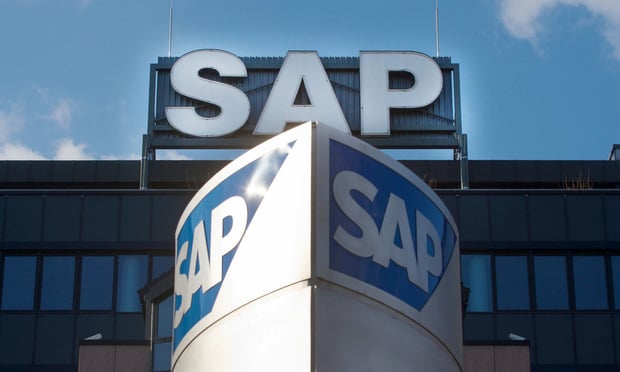SAP Can't Shake Antitrust, Copyright Suit From Former Joint Venture Partner Teradata
Although a federal judge in San Francisco said that enterprise data analytics and warehousing company Teradata Inc. would have to describe its alleged trade secrets in more detail, he largely denied SAP's motion to dismiss its former partner's lawsuit.
December 13, 2018 at 02:32 PM
3 minute read
 Signs bearing the company logo are displayed at the headquarters of SAP AG in Walldorf, Germany. Photographer: Wolfgang von Brauchitsch/Bloomberg
Signs bearing the company logo are displayed at the headquarters of SAP AG in Walldorf, Germany. Photographer: Wolfgang von Brauchitsch/Bloomberg
A federal judge in San Francisco has largely turned back a request from SAP SE to toss out claims that it pilfered trade secrets and copyrights from a former joint venture partner to create its own competing product.
Enterprise data analytics and warehousing company Teradata Inc. and its lawyers at Morrison & Foerster sued SAP in June claiming that the German enterprise software giant used the companies' joint venture as an avenue to access Teradata's trade secrets and copyrights so SAP could develop its own analytics tool, SAP HANA, which launched in 2010.
SAP's lawyers at Jones Day and Paul, Weiss, Rifkind, Wharton & Garrison argued in their motion to dismiss that Teradata hadn't sufficiently described the trade secrets they alleged were stolen, and that the suit fell outside the two-year limit to bring claims under the parties' joint venture agreements and the three-year statute of limitations.
Although U.S. District Judge William Orrick III argeed with SAP that Teradata needed to further flesh out its descriptions of the alleged trade secrets at issue, the judge allowed Teradata's remaining copyright, antitrust, and contract claims to survive. Orrick noted that Teradata claimed it wasn't on notice about the alleged trade secret and copyright theft until after a 2015 article from Der Spiegel. The German news outlet reported that during the joint venture, an internal SAP auditor found the company had misappropriated proprietary information from Teradata.
“Teradata need not plead that it initiated an investigation sometime after 2011 when it also pleads that it lacked any reasonable suspicion of misappropriation until 2015,” Orrick wrote. “Its trade secret claim did not accrue until it discovered the infringement in September 2015,” he continued.
SAP's lawyers had also argued that the Defend Trade Secrets Act, which was passed in 2016, shouldn't be applied to the trade secret allegations in Teradata's suit retroactively. Orrick, however, found that assuming the trade secret information alleged in the suit hadn't been publicly disclosed at the time it was stolen, Teradata could bring a DTSA claim under a “continuing-use” theory.
Neither companies' lawyers immediately responded to requests for comment Thursday.
Read more:
Former Joint Venture Partner Accuses SAP of Stealing Trade Secrets, Copyrights
This content has been archived. It is available through our partners, LexisNexis® and Bloomberg Law.
To view this content, please continue to their sites.
Not a Lexis Subscriber?
Subscribe Now
Not a Bloomberg Law Subscriber?
Subscribe Now
NOT FOR REPRINT
© 2025 ALM Global, LLC, All Rights Reserved. Request academic re-use from www.copyright.com. All other uses, submit a request to [email protected]. For more information visit Asset & Logo Licensing.
You Might Like
View All

Lawyers Across Political Spectrum Launch Public Interest Team to Litigate Against Antisemitism
4 minute read
Jones Day Names New Practice Leaders for Antitrust, Business and Tort Litigation and Latin America

Supreme Court Denies Trump's Request to Pause Pending Environmental Cases
Trending Stories
- 1German Court Orders X to Release Data Amid Election Interference Concerns
- 2Litigation Trends to Watch From Law.com Radar: Suits Strike at DEI Policies, 'Meme Coins' and Infractions in Cannabis Labeling
- 3Judge Gets Public Reprimand for Favoring Cops
- 4Investor Sues in New York to Block $175M Bitcoin Merger
- 5Landlord Must Pay Prevailing Tenants' $21K Attorney Fees in Commercial Lease Dispute, Appellate Court Rules
Who Got The Work
J. Brugh Lower of Gibbons has entered an appearance for industrial equipment supplier Devco Corporation in a pending trademark infringement lawsuit. The suit, accusing the defendant of selling knock-off Graco products, was filed Dec. 18 in New Jersey District Court by Rivkin Radler on behalf of Graco Inc. and Graco Minnesota. The case, assigned to U.S. District Judge Zahid N. Quraishi, is 3:24-cv-11294, Graco Inc. et al v. Devco Corporation.
Who Got The Work
Rebecca Maller-Stein and Kent A. Yalowitz of Arnold & Porter Kaye Scholer have entered their appearances for Hanaco Venture Capital and its executives, Lior Prosor and David Frankel, in a pending securities lawsuit. The action, filed on Dec. 24 in New York Southern District Court by Zell, Aron & Co. on behalf of Goldeneye Advisors, accuses the defendants of negligently and fraudulently managing the plaintiff's $1 million investment. The case, assigned to U.S. District Judge Vernon S. Broderick, is 1:24-cv-09918, Goldeneye Advisors, LLC v. Hanaco Venture Capital, Ltd. et al.
Who Got The Work
Attorneys from A&O Shearman has stepped in as defense counsel for Toronto-Dominion Bank and other defendants in a pending securities class action. The suit, filed Dec. 11 in New York Southern District Court by Bleichmar Fonti & Auld, accuses the defendants of concealing the bank's 'pervasive' deficiencies in regards to its compliance with the Bank Secrecy Act and the quality of its anti-money laundering controls. The case, assigned to U.S. District Judge Arun Subramanian, is 1:24-cv-09445, Gonzalez v. The Toronto-Dominion Bank et al.
Who Got The Work
Crown Castle International, a Pennsylvania company providing shared communications infrastructure, has turned to Luke D. Wolf of Gordon Rees Scully Mansukhani to fend off a pending breach-of-contract lawsuit. The court action, filed Nov. 25 in Michigan Eastern District Court by Hooper Hathaway PC on behalf of The Town Residences LLC, accuses Crown Castle of failing to transfer approximately $30,000 in utility payments from T-Mobile in breach of a roof-top lease and assignment agreement. The case, assigned to U.S. District Judge Susan K. Declercq, is 2:24-cv-13131, The Town Residences LLC v. T-Mobile US, Inc. et al.
Who Got The Work
Wilfred P. Coronato and Daniel M. Schwartz of McCarter & English have stepped in as defense counsel to Electrolux Home Products Inc. in a pending product liability lawsuit. The court action, filed Nov. 26 in New York Eastern District Court by Poulos Lopiccolo PC and Nagel Rice LLP on behalf of David Stern, alleges that the defendant's refrigerators’ drawers and shelving repeatedly break and fall apart within months after purchase. The case, assigned to U.S. District Judge Joan M. Azrack, is 2:24-cv-08204, Stern v. Electrolux Home Products, Inc.
Featured Firms
Law Offices of Gary Martin Hays & Associates, P.C.
(470) 294-1674
Law Offices of Mark E. Salomone
(857) 444-6468
Smith & Hassler
(713) 739-1250






